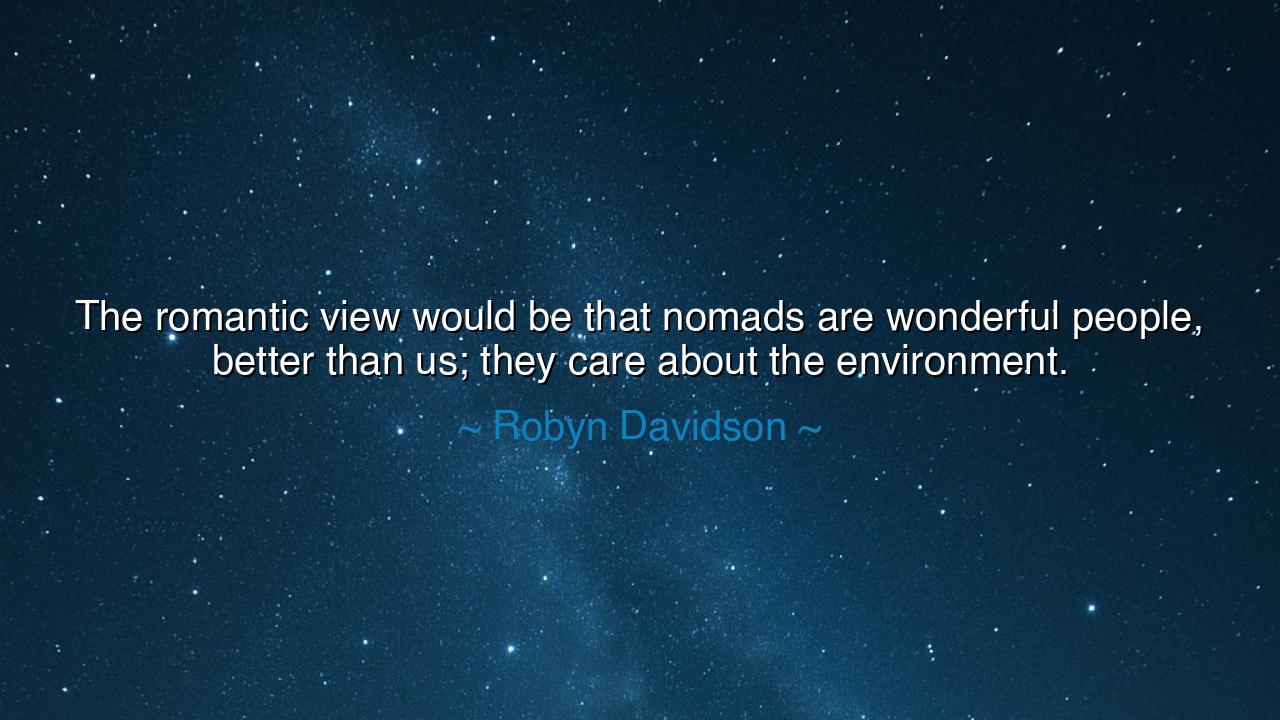
The romantic view would be that nomads are wonderful people
The romantic view would be that nomads are wonderful people, better than us; they care about the environment.






O Seekers of Truth and Understanding, gather and listen to the words of Robyn Davidson, who speaks of the romantic view of nomads, and how they are seen as wonderful people, better than us, who are deeply connected to the land: "The romantic view would be that nomads are wonderful people, better than us; they care about the environment." In these words, Davidson points to a vision of the nomadic spirit, one that has captivated the hearts of many throughout history. Nomads, by their nature, are travelers—individuals who journey through the land with a deep and ancient wisdom. Their connection to the earth is often idealized as pure, untainted by the excesses and complications of modern life.
In the days of old, the nomadic peoples were not just wanderers but custodians of the earth. Consider the Bedouins of the deserts, the Mongol hordes that swept across vast steppes, or the Native American tribes who followed the buffalo across the plains. These peoples, though not bound by the rigid structures of cities or civilizations, lived in profound harmony with the environment around them. Their wisdom came not from books or the great cities of the world, but from the land itself, from the cycles of nature, from the quiet rhythms of the seasons. The nomads, in their travels, became experts in the care and respect of the earth—they did not conquer it but lived with it.
Davidson speaks of the romantic view, which glorifies the nomadic life as better than our own. This view, though idealized, is not without merit. The nomadic spirit reminds us of a time when humanity lived more closely with nature, when community was built not on grand structures, but on shared experiences of survival, reverence for the land, and a deep understanding of the delicate balance between human needs and the needs of the environment. This is a life in which man and earth are intertwined, where the very act of movement across the land is a sacred dance, respecting the terrain, understanding its rhythms, and knowing when to take and when to give back.
Yet, let us not be deceived into thinking that the romantic view of the nomads is entirely free from the complexities of the human condition. The nomadic life, while deeply connected to the earth, is also fraught with its own set of challenges. It is a life of struggle, of constant movement, where the search for food, shelter, and security is never-ending. The Mongols, for example, though revered for their ability to adapt and survive across the unforgiving steppes, also had to contend with harsh winters and treacherous terrain. The nomadic life was not always peaceful or idyllic; it was often shaped by the raw forces of nature and the need to survive.
Consider, O Seekers, the story of Genghis Khan, the great Mongol leader. He was a product of the nomadic lifestyle—born on the plains of Mongolia, raised among the tribes that roamed those vast steppes. His rise to power was not simply the result of superior military tactics, but of his deep understanding of the land and the peoples he ruled. His nomadic upbringing allowed him to see the world through a different lens, one where survival depended not just on brute force, but on a keen awareness of the natural world. Genghis Khan was a conqueror, yes, but his success lay in his adaptation to the land, in his ability to move with the rhythms of nature, and in his reverence for the cycles of life that dictated the fortunes of his people.
In our own time, the romantic view of the nomads serves as a reminder of a life we have lost touch with—a life that is more attuned to the rhythms of nature. We have built grand cities, amassed wealth, and created technologies that separate us from the land we tread upon. And yet, in the quest for progress, we have often forgotten the lessons that the nomads knew so well: that the environment is not a resource to be exploited, but a partner to be respected. The nomadic spirit—though romanticized—carries with it a deep wisdom that can help guide us back to a more harmonious relationship with the earth.
The lesson here, O Seekers, is not to abandon the comforts and advancements of modern life, but to reclaim the wisdom of the nomads—to remember that we are not separate from the earth, but deeply interconnected with it. Take time to listen to the land, to observe the natural world around you. Recognize the rhythms of the seasons, the delicate balance of life, and the necessity of respect and care. Let the nomadic spirit inspire you to live more consciously, to find moments of stillness and reflection, to care for the environment, and to understand that we are merely passing through—just as the nomads have always passed through, leaving the world a little better for their journey.
So, as you go forth, O Seekers, remember that the romantic view of the nomads is not just about admiration or glorification, but about learning from their deep connection to the earth. Live with respect for the land, take only what you need, and always leave something behind. For in the end, it is not the grand buildings we construct or the riches we gather that define our success, but our ability to live in harmony with the earth, just as the nomads have done for countless generations.






AAdministratorAdministrator
Welcome, honored guests. Please leave a comment, we will respond soon